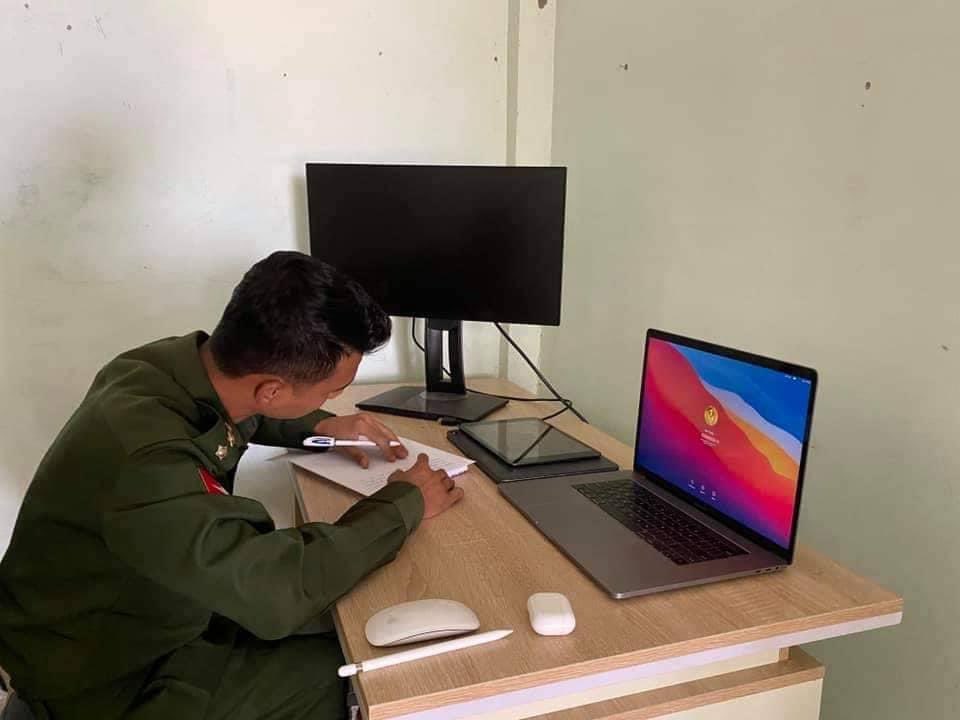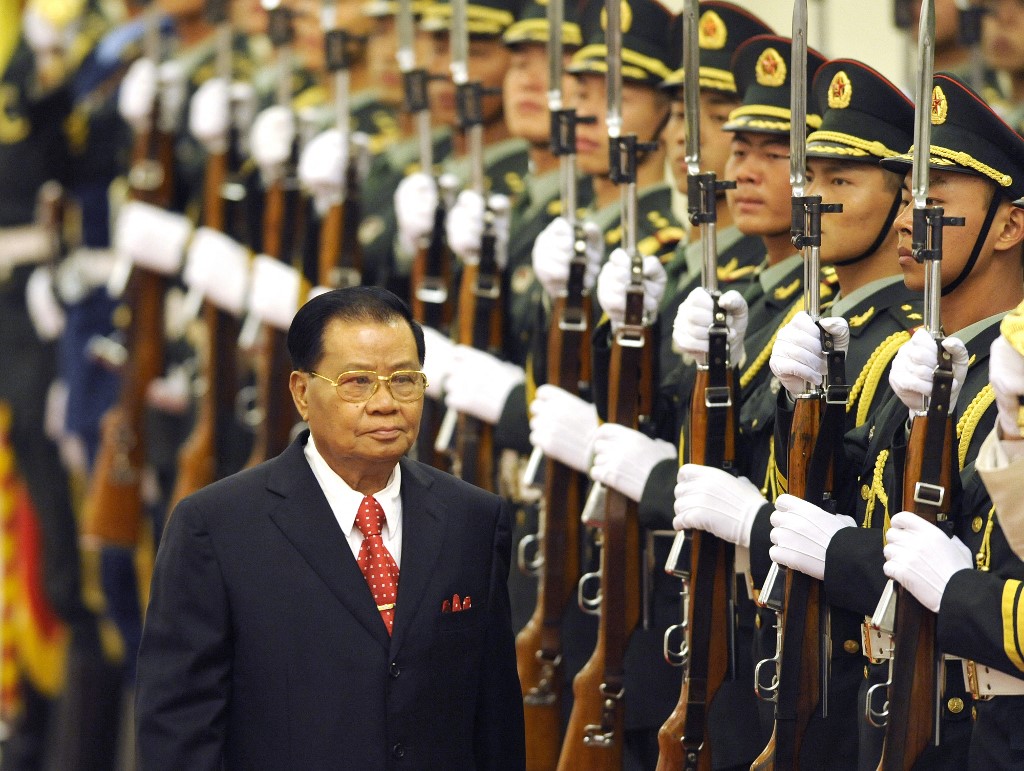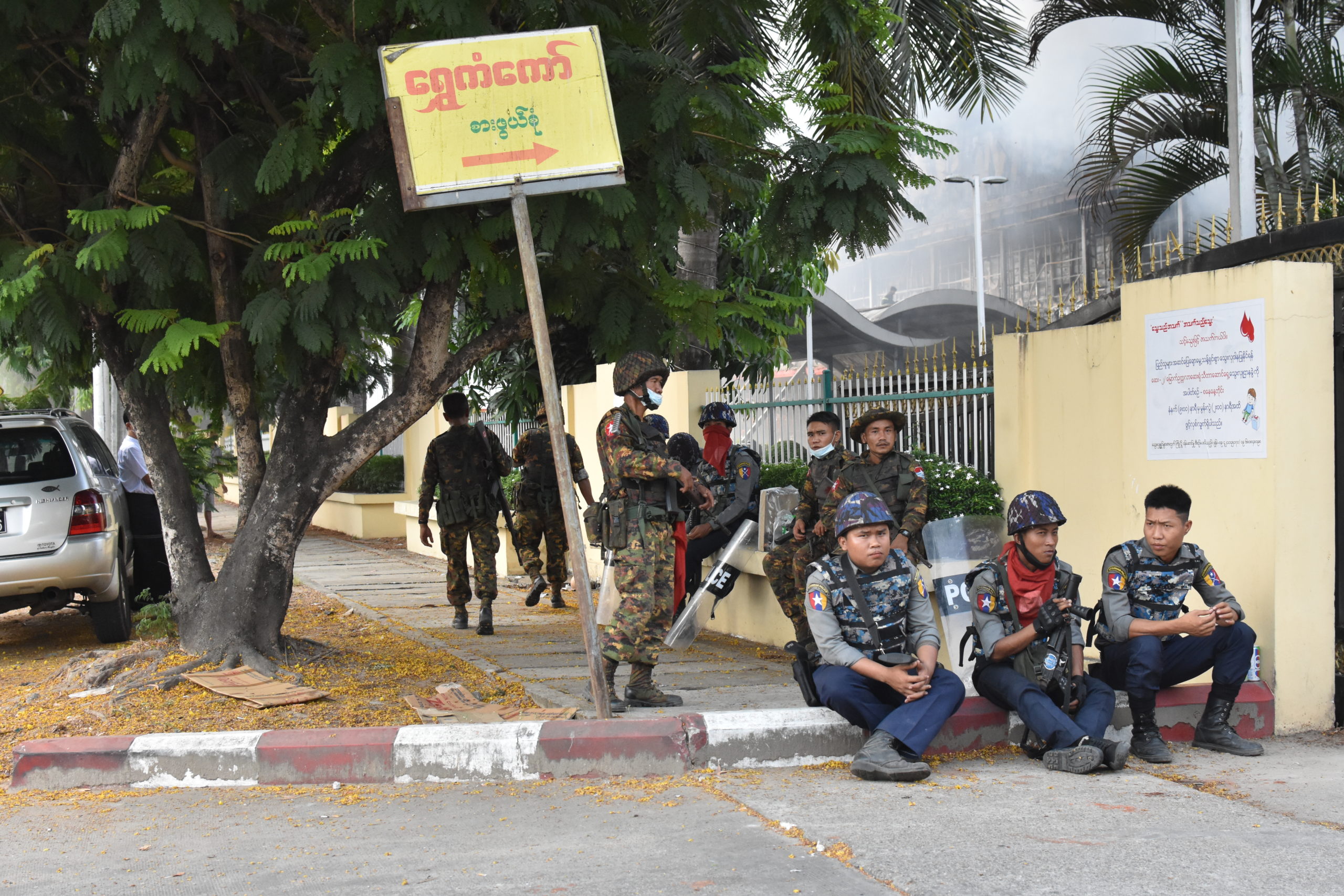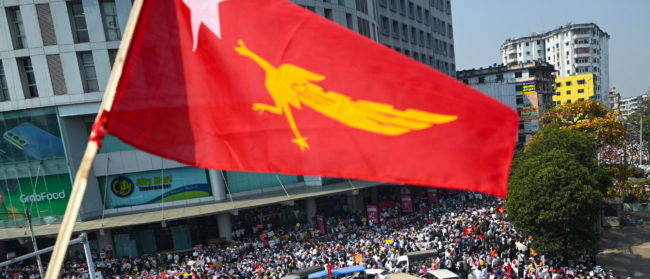Officer Pyae Sone Tun’s face flashes across the screen for a brief moment, his voice cutting in and out. He is walking quickly down a dirt path, holding his phone upwards in the hope of catching a better signal, but his internet connection is weak and the call sputters and disconnects.
He is one of a growing number of soldiers to have defected from the Myanmar military, known as the Tatmadaw, since its February 1 coup. Now forced into hiding, he is working to support the Civil Disobedience Movement (CDM) from a remote location near the Thai border.
“I dislike the Tatmadaw and didn’t want to work with them anymore, that’s why I left,” Pyae Sone Tun told the Globe. “They [military’s senior leaders] only work for their own interests, to protect their own businesses. They kill the people, they don’t protect the people, that’s why I want to eliminate the Tatmadaw.”
Soldiers like Pyae Sone Tun are part of a growing resistance to the military. Their departure at once signals a threat to the tenability of the institution, while also hinting at more widespread disunity at all stratas as the Tatmadaw grapples with an unwavering protest movement and rumoured discord among cronies hurt by the economic effects of the coup. But for an institution that has displayed an unnerving durability for decades, it remains to be seen whether these small schisms are enough to topple the regime.
Pyae Sone Tun, who had been working as a warrant officer, deserted his base in Hmawbi on March 4. As one of the first soldiers to defect since the coup, he snuck past the gates in the township north of Yangon before dawn and kept moving until he made it safely to the “liberated area”, a region under ethnic control.
“I faced many difficulties before I arrived at the liberated area. The special branch police and military officers were following me and restricted the gate,” said Pyae Sone Tun. “At the time, they couldn’t see me, but after that, I guess they started searching everywhere.”
Captain Nyi Thuta, who also defected on March 4 from his base in Naypyidaw, faced similar difficulties. Hailing from a military family, he had joined the Tatmadaw at the age of 18 at his mother’s urging and gradually rose up to the rank of captain, working predominantly for the military-run media networks like MRTV and Myawaddy.
However, the aftermath of the coup changed everything. He saw history repeating itself and, terrified that the military would destroy the country the same way it had in 1988, he chose to leave. Aware that many of his fellow soldiers felt the same, he wanted to help others who wished to defect as well.
“I was scared. I was afraid the public would not believe me. So after I joined the CDM, I started posting against the coup on social media. In posting, I encouraged the other soldiers to be involved in the opposition process for our country,” Nyi Thuta said. “As a result, many soldiers asked me how to join the CDM, how to save their lives.”

Social media has been an integral resource for soldiers looking to defect, connecting them with an expansive network across the country and mobilising a mass opposition to the junta regime. This has made defecting easier than it may have been during past military coups, especially in helping newly-defected soldiers find safe places to hide, according to Pyae Sone Tun.
This connectivity, which increased exponentially under the civilian National League for Democracy (NLD) government elected in 2015, also broke down parts of the military’s strategic isolation intended to keep soldiers in line. For five years, as Myanmar opened up, civilians and soldiers alike had novel access to the rest of the world, enjoying newfound freedoms and access that had previously been suppressed.
The threat of a return to these strongarm days has played a part in fuelling the opposition movement as well as the large number of soldiers now defecting to join CDM, according to Charles Petrie, the former UNDP resident representative to Myanmar from 2003 to 2007.
“I don’t think they [military] sufficiently appreciated how much the population had changed – how much those years of relative openness had allowed a new generation to feel a sense of greater freedom and how much they weren’t willing to give it back,” said Petrie.
“They didn’t realise that the fear factor isn’t there, and that’s what they’re trying to reintroduce now.”
While the threat of a return to the isolation of previous generations spurs discontent within the Tatmadaw’s ranks, crucial to maximising defections is offering disgruntled troops a new military institution to embed themselves in.
The National Unity Government (NUG), a shadow government established by elected officials toppled in the February 1 coup, announced on May 9 the establishment of the People’s Defence Force (PDF), a precursor to a federal army that would directly oppose and aim to replace the Tatmadaw.
Since then, individual PDFs have emerged across the country among resistance groups to fight back against the military, a development that many defected soldiers believe is promising.
“I will serve any kind of role in the PDF or federal army to end the military rule. It will be necessary to increase the number of soldiers who defect to the Tatmadaw, and join the CDM,” said Pyae Sone Tun. “If the number of defected soldiers increases, we can better fight to end the military rule.”
When we say the federal army, there will be a combination of ethnic armed organisations and PDF, and as a former Tatmadaw soldier, ethnic armed organisations were the enemy of us
On May 9, Myanmar-Now reported that Major Hein Thaw Oo, the highest ranking officer to defect since the coup, had been leading training among youths who had fled violence-prone cities and towns. His location has not been disclosed for his safety, but it is one of the first major instances of a former soldier training new recruits for what could become a PDF.
However, other soldiers, like Nyi Thuta, are not as willing to take up arms against the military, unable to reconcile that it would mean fighting alongside their former enemies.
“I won’t join the federal army, but I will support the PDF,” he said. “Because when we say the federal army, there will be a combination of ethnic armed organisations and PDF, and as a former Tatmadaw soldier, ethnic armed organisations were the enemy of us.”
The NUG’s federal army would be formed as an alliance between existing ethnic armed organisations (EAOs) from around the country, many of whom have already begun training new recruits. But despite individual efforts, no major EAOs have yet endorsed the federal army in any official capacity, with many expressing skepticism over the feasibility of a united front and a lack of federal rights.

While the defections of Tatmadaw soldiers have dealt a symbolic blow to the military, individual departures would need to be on a far greater scale to signal meaningful disunity within the Tatmadaw, according to Petrie.
“As long as we only see individual defections, and they aren’t that enormous, it doesn’t really indicate much,” said Petrie. “The sign would be when you see the defection of a unit or a senior commander or general.”
But something of this scale may not be too far off, with many of the defected soldiers claiming that discontentment around the coup and the junta extends far and wide, reaching the highest of levels of both the present and former leadership.
“I think, within the Myanmar military, soldiers are not united because there are many corruption problems,” said Pyae Sone Tun. “Some from Tatmadaw will be happy [about] the coup because of their interests, but some who are working closely with senior leadership, who have empathy and kindness, have not been happy.”
Speculation of discontent among senior military figures, particularly among former generals, began to spread shortly after the coup, with rumours circulating that there was widespread disapproval of the putsch and the mass violence used to quash protests in its aftermath.
“Private conversations in Yangon and Naypyidaw suggest an increasing dissatisfaction towards Gen. Min Aung Hlaing. Ultimately, a return to Western sanctions jeopardises ten years of progress,” a source in close contact with military families, who wished to remain anonymous for fear of reprisal, told the Globe.
“The brutal crackdown on individual liberties – a response far disproportionate to the threat of protests – has reduced spending [in Myanmar] to a virtual standstill.”

Than Shwe calculated that this was an opportunity for his successor to take over power because of the Covid-19 pandemic – the world is isolated and wouldn’t react quickly
Among those rumoured to be unhappy is former General Than Shwe and his cronies, several of whom were reportedly targeted by the new regime shortly after the coup.
The Irrawaddy reported that U Zaw Zaw, U Chit Khaing, and U Maung Weik, three of Myanmar’s wealthiest business tycoons, were briefly questioned by the military for their dealings with toppled state counsellor and NLD leader Aung San Suu Kyi. All three were previously targeted with restrictive measures and asset freezes by the EU due to their ties to Than Shwe while he was in power. Since these forced talks, all three figures have been “eerily quiet”, according to the same source in close contact with military families.
Thura Shwe Mann, a former member of parliament, dubbed “Than Shwe’s right-hand man” by the US State Department in 2007 given his close relationship with the former general, was also reportedly detained shortly after the coup, according to Myanmar-Now.
But true to the secretive nature of the Tatmadaw, a definitive answer on internal dynamics is hard to come by. While rumours of disaccord circulate, others in contact with those close to Than Shwe claim the former general did support the coup.
“According to reliable information from internal sources, General Than Shwe supported the coup. He encouraged Min Aung Hlaing to take over power from NLD because he never enjoyed Aung San Suu Kyi,” said Nyi Nyi Lwin, a political analyst in contact with military officers close to Than Shwe.
“He calculated that this was an opportunity for his successor to take over power because of the Covid-19 pandemic – the world is isolated and wouldn’t react quickly.”
But one thing that is beyond doubt is the economic hit many in and close to the military have suffered as a consequence of the coup. Business figures with ties to the military maintain that the economic fallout from the putsch, as well as the accompanying reputation destruction internationally, have sparked outrage and frustration.
The owner of a major Myanmar business with previous ties to the military through former leasing contracts, who asked to remain anonymous for fear of reprisal, told the Globe that his business has been shuttered by the coup, with Western trade partners pulling out of the country and terminating contracts.
His company has not been sanctioned directly. But their previous dealings with Myanmar Economic Holdings Limited (MEHL) – one of the military-owned conglomerates now sanctioned by a multitude of foreign governments, including the US, UK, and EU – has scared away prospective international partners who fear ties to the junta.
He said his company has recorded an estimated 85-90% drop in revenue in the last year.
“We waited for six decades to be a country that was globally accepted and be able to have an economy and stability. And now, all the positives that have happened in the past ten years have been undone,” he said.
“People feel as though there are benefactors in the business sector to this [coup], but I don’t see a single person happy.”


